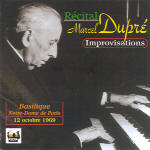Any example of Marcel Dupré’s improvising prowess is important to have in general circulation, and this previously unreleased, totally improvised performance is no exception. On October 12, 1969, the 83-year-old organist gave his last recital on the Cavaillé-Coll organ in the cathedral at Notre-Dame in Paris. The 40-minute program consisted solely of improvisation: a double fugue and a four movement symphony, based on themes by Notre-Dame’s resident organist (and improviser extraordinaire) Pierre Cochereau. Dupré demonstrates the themes first, and lets his fertile imagination take over from there. While Dupré’s extemporaneous harmonic language seems to encompass more conservative parameters than his compositions often do, he runs a tight ship as far as form and proportion are concerned. At times you sense the organist grasping for and sketching ideas that are not 100 percent fully formed, as in the chattering chord clusters of the Symphony’s finale, or a few wandering progressions midway through the wry Intermezzo. But what dramatic and emotional contrast in Dupré’s registrations, and how nimbly his brain, fingers, and heart work in effortless tandem! The disc’s remainder offers vintage 1926-35 recordings from Dupré’s prime, highlighted by his imaginative Prelude and Fugue in G minor (Op. 7 No. 3), and a bracing performance of the finale from Bach’s first Trio Sonata. Tahra’s transfers are noisy but lifelike and true to timbre. My rating as far as sonic quality, however, reflects the aforementioned live recording.
































